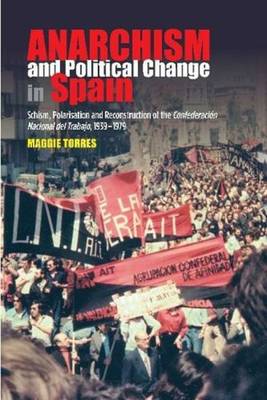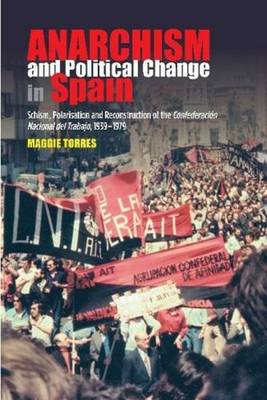
- Afhalen na 1 uur in een winkel met voorraad
- Gratis thuislevering in België vanaf € 30
- Ruim aanbod met 7 miljoen producten
- Afhalen na 1 uur in een winkel met voorraad
- Gratis thuislevering in België vanaf € 30
- Ruim aanbod met 7 miljoen producten
Zoeken
Anarchism and Political Change in Spain
Schism, Polarisation and Reconstruction of the Confederacion Nacional del Trabajo, 1939-1979
Maggie Torres
€ 271,45
+ 542 punten
Uitvoering
Omschrijving
This history of the anarcho-syndicalist trade union, the Confederacion Nacional del Trabajo, analyses a period much neglected in historical research: from the end of the civil war in 1939 to the period of democratic change from 1976 to 1979, when the organisation was reconstructed after Francos death. The Franco years were characterised by extraordinary division within the CNT and by the bureaucratisation and ossification of the organisation now part in exile in France. The decimation of the Spanish CNT in 1947 by draconian repression enhanced the role of the exiled CNT, which was now the sole representative of the historic Anarchist movement in Spain. The moribund notion of Anarchism held by the exiled organisation could not attract recruits, and thus new forces drawn to Anarchism in 1960s Spain came through different routes, related, in large part, to the crisis within Marxism. Some of these local activists became convinced of the possibility for a reconstructed CNT, but only if the organisation were renewed. However, the exiled CNT opposed such ideas and used all possible means to undermine the movement for a new CNT. Although the reconstruction of the CNT from 1976 was characterised by the struggle between these two principal forces, the Spanish CNT captured the feelings and enthusiasm of Spanish youth, after the long dark night of Francoism. The libertarian boom was short-lived however, and by 1978 the CNT was in deep crisis, calling for the dissolution of the exiled organisation. The latter, and its allies in Spain, could not allow such a development and organised the Congress of 1979 to prevent this happening. The subsequent irrevocable division of the CNT sheds lights on the political, social and economic fractures that Spain still experiences today. Published in association with the Canada Blanch Centre for Contemporary Spanish Studies, LSE
Specificaties
Betrokkenen
- Auteur(s):
- Uitgeverij:
Inhoud
- Aantal bladzijden:
- 420
- Taal:
- Engels
- Reeks:
Eigenschappen
- Productcode (EAN):
- 9781845199364
- Verschijningsdatum:
- 21/11/2018
- Uitvoering:
- Hardcover
- Formaat:
- Genaaid
- Afmetingen:
- 163 mm x 224 mm
- Gewicht:
- 748 g

Alleen bij Standaard Boekhandel
+ 542 punten op je klantenkaart van Standaard Boekhandel
Beoordelingen
We publiceren alleen reviews die voldoen aan de voorwaarden voor reviews. Bekijk onze voorwaarden voor reviews.








